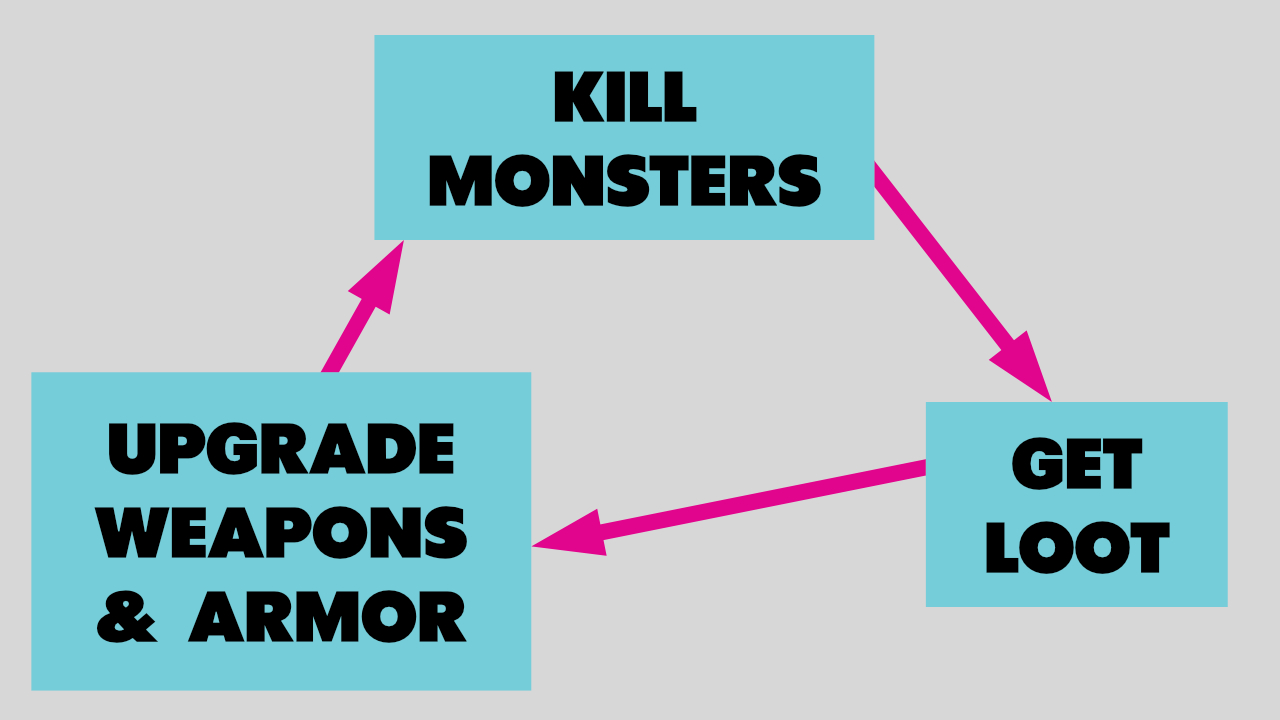What is a core game loop?
Exploring the concept of a "core game loop" in tabletop board games and roleplaying games, why it benefits players, and how it can become a compulsion loop.
Welcome to Skeleton Code Machine, an ENNIE-nominated and award-winning weekly publication that explores tabletop game mechanisms. Check out Public Domain Art and Fragile Games to get started. Subscribe to TUMULUS to get more design inspiration delivered to your door each quarter!
Last week we looked at how Black Sonata uses interesting and elegant mechanisms to create a solo deduction game with hidden information. This week we are exploring a more general concept: the core game loop.
What is a core game loop?
Riot Games provides a helpful definition of “core game loop” at URF Academy:
The core game loop is the repeated set of actions that a player engages in while engaging with the game.
A game might have you set up the board, begin the game, take turns for X rounds, and then determine victory points. That is the high-level game loop. At a slightly more detailed level, the loop might include an action phase (with N actions per player), a clean-up phase, and other steps that happen each round.
In its simplest form, the core game loop defines sequential player actions and game states that are repeated throughout the game.
Two simple examples
You are a Muffin (shop) is one of the first games I created. Playing with the idea of what a journaling game could be, I wondered if you could turn almost anything into a game.
Unlike most games where you are playing the role of another person, in this game you are a pastry in a coffee shop. From your spot on the counter, you’ll watch as customers come and go… as you slowly become more stale. Customers place orders, and perhaps take a seat to stay a while. There’s a chance that they might choose you as their snack, but that’s fine. After all, that’s why you were made.
Here’s the core game loop of You are a Muffin:
A new customer arrives
An order is placed
A seat is taken
Items are consumed:
If you are eaten, the game concludes
If you were not eaten, continue
A customer leaves
You become more stale
Begin the next hour, returning to Step 1
You can see how this takes the description above and structures it into clear, sequential steps that can be followed. A player starts at Step 1, continues to Step 7, and then returns to the top at Step 1. This loop of actions continues until the end game is triggered.
This loop is simple and involves almost no player agency.1 You could do the same for simple video games such as Contra where the game loop is roughly:
Bill and Lance move through the level to the right2
Defeat enemies
Beat the level boss
Repeat
More complex games still have an identifiable core game loop, although they will usually have branches and multiple paths. There might be multiple sub-loops that happen during specific phases.
For example, one of the third-party, player-created flow charts for Arkham Horror (Launius & Wilson, 2005) is five pages when printed. Each phase of the game has its own loops, but they all are incorporated into the overall game loop.
How core game loops help players
Whether explicitly or not, players often assume a game has a core game loop. It’s not without good reason — a core game loop benefits the player in many ways:
Provides a quick overview: If a player wants to get a quick idea of how a game plays, having a well defined core game loop is invaluable. It acts as both a way to briefly communicate the type of game and as a teaching tool when it is time to actually play. This is far better than having to read many pages just to understand how the game works.
Guides player actions: Once the player understands the steps of each game, they can develop a strategy — which actions they should take and when they should act. Without a well-defined loop, players can feel lost and unsure what to do next.
Maintains player engagement: Riot Games goes on to say that a game loop can “build positive expectations from the player for a game experience.” This is either consciously or subconsciously, but the cycle of taking actions (e.g. defeating a boss) and getting rewards (e.g. leveling up) keeps players interested. Without a core game loop, the player won’t know to expect (i.e. anticipate) the next reward.
Creates the framework for a game arc: A core game loop is good, but doing the exact same thing over and over gets boring. Great games have a game arc — the rise and fall of action in the game. If a game arc organizes the changes taking place into a beginning, middle, and end, the core game loop is the structure underpinning that organization.
And it’s not just players that benefit. As a game designer, working on the core game loop first allows you to create a minimum viable game quickly.3 I’ve also found it’s a great way to identify potential problems such as having the end game trigger in the wrong place or being unable to take certain actions on your first turn. Additionally, a well-defined game loop makes writing the rules much easier — just explain each step.
Core game loop vs. compulsion loop
If a core game loop is specifically designed to motivate players through the anticipation of rewards, it can also be considered a compulsion loop. This compulsion loop might even employ operant conditioning techniques such as a variable ratio (VR) schedule — a chance at a reward each time but not always after the same nth response.
Modern video games do this by allowing players to battle enemies that (randomly) drop crafting material loot which allows them to create better weapons. The better weapons allow them to fight higher level enemies that might drop better loot — a sequence of never ending slot machines that you play by hitting them with a sword.
The compulsion can be further enhanced by the addition of loot boxes, multiple interconnected compulsion loops, and special visuals/sounds when the rewards are given out. The goal is to keep you playing the game.
Explicitly designed compulsion loops are usually confined to the realm of video games, but I think they are still worth noting here and understanding them. There is a reason they work, and the general concepts can be used to design more engaging tabletop games.
Do games need a core game loop?
The answer, of course, depends on how you define a core game loop. I’d argue that the vast majority of games rely on a sequence of repeated actions. The ability to define the core game loop depends on what level of abstraction you use.
For example, in Contra we could say the core game loop is: “Complete levels until you win the game.” That uses a higher level of abstraction vs. the details of defeating enemies and bosses, but still conveys a loop.
The same could be done for open-world TTRPGs like Dungeons & Dragons or Lancer. Players go on an adventure (e.g. dungeon crawl or mech combat), return to town/base to rest and resupply, and repeat. In both games, combat uses a much more detailed and explicit core game loop using turns, rounds, and actions.
Even possible exceptions like legacy games and escape room games where there is very little repetition usually have a loop of some sort. Even if that loop is “solve puzzle, use the output of the last puzzle to solve the next puzzle, repeat.”
Conclusion
Some things to think about:
Core game loops help the player: Players want to know how to play the game and what they can do at a given point in the game. A clearly defined game loop is a concise way to communicate what they want. It also allows them to anticipate what is coming next, fostering engagement and strategy.
Core game loops help the designer: In the early design stages, a core game loop can help get you to playtesting faster and get early feedback. It can also help identify problems in game flow early in the design process.
Complexity and loops: The more complex a game becomes, the harder it may be to document the core game loop. This is particularly true with open-world games where players can do almost anything at any time. Still, using a higher level of abstraction, some form of loop (i.e. repeated game states) can be defined.
What do you think? Are core game loops an important part of all games or just some games? Do they benefit the player or designer more?
— E.P. 💀
P.S. Subscribe to TUMULUS, the Skeleton Code Machine quarterly to get game design inspiration delivered to your door. Issue 2 is shipping now. Chanse Hungerford shared his thoughts on the first issue. Check it out:
Skeleton Code Machine is a production of Exeunt Press. All previous posts are in the Archive on the web. Subscribe to TUMULUS to get more design inspiration. If you want to see what else is happening at Exeunt Press, check out the Exeunt Omnes newsletter.
I used to think that games needed player agency (i.e. choices that impact game state) to be fun, but I no longer believe that to be the case. I wrote about this when discussing the Carta SRD and player agency. Solo journaling games like You are a Muffin and The Last Tea Shop essentially have zero player agency, but are still fun and interesting games.
The exception being the pseudo-3D perspective stages which show up a few times.
The idea of a Minimum Viable Product (MVP) is the version of a product with just enough features to be usable by early customers. The goal is just to get something out there to collect feedback, enabling additional development. It’s an interesting idea that can be applied to game design — make the core of the game and get it playtested early.









I'll take it further: These days in TTRPGs, I'm basically always looking for an explicit articulation of the core game loop up front. For me, it's almost a bit of a let down, or even a red flag, if I'm reading a brand new TTRPG in 2025 and I can't discern such a thing.
I've had too many excellent experiences with the power of the core game loop lately (Monster of the Week, Blades, Brindlewood Bay, arguably Mausritter) and too many major let-downs in its absence (D&D 5e) that I'm convinced we need to put core game loops at center stage.
I’m in the current minority of Neutral/Depends, and that’s because I’m taking the ‘well-defined’ element strongly. D&D, for instance, doesn’t have a well-defined core game loop IMO. There are several implicit game loops at various levels (e.g. combat, or the explore, short rest, long rest loops) but it isn’t well defined and doesn’t need to be.
On the other hand, Blades in the Dark has a clear and well-defined core loop which is spelled out in the game - Free Play, Engagment Roll, Score, Downtime (repeat). There are implicit game loops within the game, but this is a core game loop which is explicitly defined and is one of the defining features of this game.
My recently kickstarted game, Tail-End Charlie has a core game loop of Operation - > Downtime (repeat) and that is central to the experience of the game.
So IMO, ‘it depends’ because some games use a well-defined core game loop as a central philosophy to the way the game works, and other games have one or more implicit game loops which naturally arise, but are not spelled out as such. And that is OK!